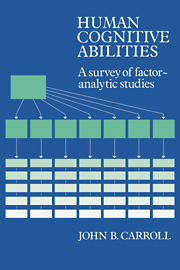Book contents
- Frontmatter
- Contents
- Preface
- PART I INTRODUCTION TO THE SURVEY
- PART II THE IDENTIFICATION AND DESCRIPTION OF COGNITIVE ABILITIES
- Chapter 5 Abilities in the Domain of Language
- Chapter 6 Abilities in the Domain of Reasoning
- Chapter 7 Abilities in the Domain of Memory and Learning
- Chapter 8 Abilities in the Domain of Visual Perception
- Chapter 9 Abilities in the Domain of Auditory Reception
- Chapter 10 Abilities in the Domain of Idea Production
- Chapter 11 Abilities in the Domain of Cognitive Speed
- Chapter 12 Abilities in the Domain of Knowledge and Achievement
- Chapter 13 Psychomotor Abilities
- Chapter 14 Miscellaneous Domains of Ability and Personal Characteristics
- Chapter 15 Higher-Order Factors of Cognitive Ability
- PART III ISSUES
- References and List of Datasets
- Appendix A Codes for Countries, Samples, and Factors
- Appendix B Hierarchical Factor Matrix Files
- Name Index
- Subject Index
Chapter 14 - Miscellaneous Domains of Ability and Personal Characteristics
Published online by Cambridge University Press: 29 September 2009
- Frontmatter
- Contents
- Preface
- PART I INTRODUCTION TO THE SURVEY
- PART II THE IDENTIFICATION AND DESCRIPTION OF COGNITIVE ABILITIES
- Chapter 5 Abilities in the Domain of Language
- Chapter 6 Abilities in the Domain of Reasoning
- Chapter 7 Abilities in the Domain of Memory and Learning
- Chapter 8 Abilities in the Domain of Visual Perception
- Chapter 9 Abilities in the Domain of Auditory Reception
- Chapter 10 Abilities in the Domain of Idea Production
- Chapter 11 Abilities in the Domain of Cognitive Speed
- Chapter 12 Abilities in the Domain of Knowledge and Achievement
- Chapter 13 Psychomotor Abilities
- Chapter 14 Miscellaneous Domains of Ability and Personal Characteristics
- Chapter 15 Higher-Order Factors of Cognitive Ability
- PART III ISSUES
- References and List of Datasets
- Appendix A Codes for Countries, Samples, and Factors
- Appendix B Hierarchical Factor Matrix Files
- Name Index
- Subject Index
Summary
Chapters 5 to 13 present discussions of factors in our datasets as classified into a number of fairly broad domains of ability – generally, domains that embrace abilities commonly thought of as belonging under the general concept of intelligence. Many hundreds of token factors identified in the datasets are listed in those chapters. But in any enterprise that attempts to classify a large number of entities there will inevitably remain a residue not easily classified. This chapter deals with those token factors that do not easily fit into the domains previously discussed, or that for some reason defy meaningful classification and interpretation.
Factors discussed in this chapter are not necessarily less important than those dealt with in previous chapters. Some of them concern dimensions of personal characteristics that may not strictly belong under the concept of intelligence or cognitive ability. Others may have to do with cognitive ability, but they have not been widely investigated.
As far as possible, factors presented here are classified into a number of somewhat arbitrary, unrelated domains. But there are other factors that appear only rarely in the datasets, or that appear only in the form of “n-lets” (doublets, triplets) because they relate to highly specific kinds of variance. These are presented mainly in the form of lists, with appropriate discussion. The chapter ends with a list of factors in the datasets that remain uninterpreted; in general, these are regarded as resulting from statistical artifacts.
- Type
- Chapter
- Information
- Human Cognitive AbilitiesA Survey of Factor-Analytic Studies, pp. 542 - 576Publisher: Cambridge University PressPrint publication year: 1993



